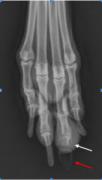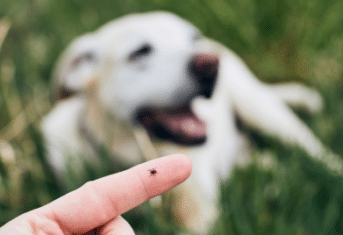Melanoma Monday: May 2, 2011

Melanoma Monday: May 2, 2011
The term “Melanoma Monday” is a service mark of the American Academy of Dermatology and seeks to promote awareness about melanoma, a deadly form of skin cancer in humans. Melanoma is one of the diseases humans share with animals – so I thought I would take this opportunity to alert dog owners about melanoma in dogs and point out the similarities and differences to the human disease.
Canine melanoma occurs in different locations than the disease does in humans. The most malignant form of the disease occurs in the mouth and toes. Unlike humans, where skin melanomas are commonly malignant, skin melanomas in the dog are often benign. The circle in the photograph on the right is a malignant melanoma of the gum just below one of the large back teeth.
Dogs with a melanoma, or any other tumor of the oral cavity, often have severe halitosis. The family might notice blood tinged saliva or a reluctance of their dog to carry toys in his mouth. Oral tumors such as melanoma can be painful and a dog with an oral tumor may suddenly refuse to eat dry dog food or dog biscuits.
Melanoma of the toe typically starts at the junction of the nail and the toe. You might notice your dog licking at the toe or a swelling at the junction. A broken nail, without preceding injury, may signal the need for an evaluation by your veterinarian as tumors can weaken the nail and allow a spontaneous break.
As with humans, an early diagnosis of this disease often leads to a much better diagnosis. Teach your puppy to let you open his mouth so you can identify any oral abnormalities. Bad breath, reluctance to eat and blood tinged saliva might not necessarily indicate the presence of a tumor, but may indicate dental problems which may also need to be treated. In either case, your veterinarian should see your dog immediately. Toe swellings, pain or nail problems should also provoke a visit to the veterinarian as early diagnosis and treatment with surgery, radiation and a melanoma vaccine clinically tested by the Animal Medical Center oncology team can save your dog’s life.
________________________________________________________
This may also be found in the “Tales from the Pet Clinic” blog on WebMD.com.
For over a century, The Animal Medical Center has been a national leader in animal health care, known for its expertise, innovation and success in providing routine, specialty and emergency medical care for companion animals. Thanks in part to the enduring generosity of donors, The AMC is also known for its outstanding teaching, research and compassionate community funds. Please help us to continue these efforts. Send your contribution to: The Animal Medical Center, 510 East 62nd Street, New York, NY 10065. For more information, visit amcny.gbtesting.us. To make an appointment, please call 212.838.7053.
































